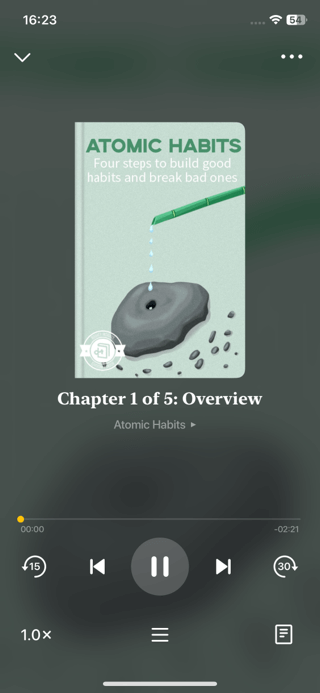Last updated on 2025/05/04
Do Epic Shit Summary
Ankur Warikoo
Embrace challenges to unlock your true potential.
Last updated on 2025/05/04
Do Epic Shit Summary
Ankur Warikoo
Embrace challenges to unlock your true potential.
Description

How many pages in Do Epic Shit?
312 pages
What is the release date for Do Epic Shit?
In "Do Epic Shit," Ankur Warikoo invites readers on an exhilarating journey of self-discovery and empowerment, urging them to break free from societal expectations and pursue their true passions. This compelling guide not only shares personal anecdotes and hard-won wisdom from Warikoo's own entrepreneurial adventures but also challenges us to redefine success beyond conventional metrics. By embracing authenticity, taking bold risks, and fostering resilience, the book inspires each of us to unleash our potential and create a life that is not just lived, but celebrated. Through practical insights and motivational storytelling, Warikoo sparks a fire within, pushing you to take meaningful action towards your dreams—because the time to do epic shit is now.
Author Ankur Warikoo
Ankur Warikoo is a dynamic entrepreneur, accomplished motivational speaker, and influential digital content creator, renowned for his engaging insights on personal growth and entrepreneurship. As the co-founder of multiple startups, including the well-known online marketplace Goibibo, he has played a pivotal role in shaping India's startup landscape. Warikoo combines his extensive business acumen with a passion for inspiring others, using platforms like social media to share valuable life lessons and experiences from his own journey. His authentic approach and relatability have garnered him a devoted following, making him a prominent figure in the realm of personal development and professional success.
Do Epic Shit Summary |Free PDF Download
Do Epic Shit
Part 1 | SUCCESS (AND FAILURE)
The relationship with success is often intricately intertwined with one’s failures. For many, including Ankur Warikoo, failures have been pivotal learning moments that pave the way toward unexpected successes. Reflecting on his journey, he emphasizes the significance of understanding what success means personally rather than adhering to societal definitions. This self-awareness allows individuals to utilize their past mistakes as guides rather than setbacks, ultimately helping them craft their own paths. 1. Embrace Productivity: There is immense satisfaction in surpassing expectations, whether it's completing more tasks than initially planned or realizing hidden potential. Genuine achievement comes from pushing personal boundaries, often leading to surprising insights about one’s capabilities. 2. Start Today, Avoid Regrets: Procrastination can lead to regret. Ankur stresses the importance of beginning the pursuit of one's goals immediately to avoid the emotional burden of missed opportunities. The choice of how to react to challenges often defines success more than the challenges themselves. 3. Action Over Words: The world is influenced by how we perceive and react to our problems. Taking action transforms potential doubts into results. Luck is not mere chance; it is ultimately a product of effort and the opportunities created through it. Our actions dictate our prospects, illustrating that persistence is essential for generating the right outcomes. 4. Multiple Identities: Life isn’t meant to be confined to a single identity or career avenue. People have the potential to explore various roles simultaneously—be it as artists, entrepreneurs, or professionals. This multifaceted approach allows for a richer, more fulfilling life experience. 5. Consistency and Authenticity in Content Creation: In the digital age, the key to effective content creation lies in being genuine and maintaining regularity. Authenticity not only simplifies the process but also enhances enjoyment in one's work, resulting in a natural flow that captivates others. 6. Reassess Definitions of Success: The constructs shaped by society regarding success and failure often deviate from personal aspirations. True success is a personal journey, derived from aligning one's actions with internal values rather than external expectations. 7. Mental Resilience: Emotional struggles can distort perceptions of failure and success. Ankur emphasizes that emotions, both happy and sad, are transient. Mental fortitude enables individuals to navigate challenges effectively and maintain focus on their goals. 8. The Power of Ego: Ego can inhibit learning and growth. Acknowledging what we don’t know allows us to seek knowledge, fundamentally expanding our skill sets and experience. True growth comes from stepping outside comfort zones rather than remaining complacent within existing knowledge. 9. Mentorship and Learning: The quest for mentors should be diversified; drawing wisdom from various stages and experiences in life can yield invaluable perspectives. It’s essential to seek mentors who resonate with one’s current phase of life and who can share relevant insights. 10. Find and Grow Your Passion: Passion is cultivated over time rather than discovered spontaneously. Nurturing small inclinations daily leads to the development of profound interests that drive long-term engagement and fulfillment. 11. Decisions and Authenticity: Balancing emotional intuition with logical decision-making enhances life choices. Financial decisions often require analytical approaches, while personal choices should stem from authenticity, fostering deeper connections. 12. The Importance of Curiosity: Ankur reminds us of the innate curiosity children possess, which often diminishes with age. Maintaining that curiosity fuels learning and innovation, allowing individuals to thrive even in challenging environments. 13. Reflection on Failures: Success is often visible, while failures remain hidden. The true essence of one’s journey lies in overcoming struggles and evolving through adversity. Embracing failures as part of growth leads to richer life experiences. 14. Perception and Validation: External opinions can trap individuals into conforming rather than authentic living. Focusing on personal desires rather than societal feedback fosters genuine happiness and fulfillment. 15. Relationships That Matter: The three pivotal relationships in life are with money, time, and ourselves. Understanding and nurturing these relationships help establish a foundation for true well-being. 16. Embracing Unconventionality: Standing out often requires rejecting norms to pursue authenticity. This path might be intimidating, but ultimately leads to self-acceptance and joy. 17. Skill Building and Reputation: As skills develop, reputation grows. The objective should be for others to trust your ability to figure things out rather than relying solely on past accolades. Warikoo's reflections on his personal and professional missteps throughout his 20s and 30s, spanning from educational pursuits to entrepreneurial ventures, illustrate the complex tapestry of experiences that contribute to one's growth. He shares regret over unexamined choices, the profound significance of relationships, and the importance of self-awareness in shaping authentic definitions of success. In examining his failures, he ultimately finds a deep sense of gratitude, recognizing that every misstep has enriched his life’s narrative and led him closer to understanding his true self. The scars of his past mistakes, he suggests, are markers of resilience—reminders of battles fought and lessons learned rather than points of shame.
Key Point: Reassess Definitions of Success
Critical Interpretation: Imagine standing at the crossroads of expectations and aspirations, feeling the weight of societal pressures to conform to a rigid definition of success. In this moment, you're invited to peel away these layers and reflect on what truly matters to you. By reassessing your own definition of success, you open the door to a world of possibilities tailored to your unique journey. Each failure you’ve encountered transforms into a stepping stone, guiding you toward a purpose-driven life that resonates with your values. This empowering perspective allows you to redefine success not as a destination, but as an ongoing journey filled with personal growth, authenticity, and the freedom to chart your own course.
Part 2 | HABITS
For many years, I have delved into the study of habits and their profound impact on our lives. Unlike setting goals, which can often lead to a singular destination and an incessant chase for more, I have found that cultivating habits allows for personal growth and opens multiple avenues in life. Simple practices, such as going to bed on time or diligently creating content over the years, have shaped who I am, proving that habits build our character while goals can leave us feeling empty. 1. The Power of Sleep - The secret to becoming an early riser is rooted in going to bed early. It’s not simply about the act of waking up; it's about the energy and mindset you carry throughout the day. By prioritizing quality sleep, I enhance my productivity and well-being, rather than waking up groggy, regretting the early rise. 2. Sharing Your Journey - Documenting and sharing your experiences serves as a powerful tool for both personal reflection and inspiring others. Your story carries value—what may feel mundane to you could be a beacon of hope or guidance for someone else. By sharing our journeys, we foster connection and allow others to learn from our experiences. 3. Curiosity Over Hard Work - Curiosity creates endless opportunities. Instead of solely relying on rigorous hard work, it’s vital to ask questions and seek knowledge. Questions that seem trivial can lead to meaningful insights, enriching both our lives and those around us. 4. Habits vs. Targets - Setting targets can easily distract us from the bigger picture of who we want to become. Instead of fixating on specific outcomes, focusing on daily habits fosters a deeper sense of accomplishment and growth. As we align our habits with our desired identity, we naturally progress towards our aspirations. 5. Embracing Struggles - Struggles are an inherent part of our journey, and attempting to minimize them only leads to emotional suppression. By choosing to glean meaning from our struggles, we can transform challenges into valuable lessons, rather than letting them weigh us down. 6. The Art of Asking - Before assuming others' intentions or feelings, we should simply ask. Whether it’s reaching out to a friend or seeking clarity in a professional relationship, inquiries can bridge gaps and foster better understanding. 7. Essential Life Skills - Certain skills, such as humor, storytelling, understanding human psychology, and effective communication, are paramount yet often overlooked. Mastering these can greatly enhance how we interact with the world. 8. Prioritizing Joy - It's crucial to engage in activities that we genuinely enjoy. Whether it's playing sports or pursuing hobbies, the energy we dedicate to activities that ignite passion makes it easier to shake off laziness. 9. Conscious Presence - The quality of our presence is more significant than mere attendance. Being fully engaged in our surroundings increases our enjoyment and connection to the moment. Discipline shines through when we are genuinely present, emphasizing intention over obligation. 10. Choosing Your Circle Wisely - The people we associate with influence our narratives and thoughts. Surrounding ourselves with positive influences fosters growth and opens up new opportunities, leading to collective progress rather than limitation. 11. Embrace Growth, Not Comfort - Progress often comes at the expense of comfort. We should seek opportunities that challenge us, focus on learning, and embrace discomfort as a means of growth rather than stagnation. In my personal life, I’ve cultivated specific habits that keep me organized and productive. I consistently use notebooks to document ideas, to-do lists, and meeting notes. Calendars govern my daily activities, ensuring I allocate time to essential, yet non-urgent tasks. Techniques such as scheduling future emails and sharing my calendar with loved ones optimize communication and communal planning. The importance of conducive environments cannot be understated. I purposefully maintain a structured workspace and create sensory cues to promote positive actions. Whether it’s placing weights by my bed or ensuring my reading materials are in easy reach, these small adjustments lead to significant changes in productivity and mindset. As we navigate an increasingly demanding world, it's essential to remain vigilant against distractions and prioritize sleep, well-being, and consistent growth. A small, daily improvement compounds over time, enabling us to progress toward our goals while savoring the journey. Ultimately, it comes down to intent; with the right mindset, any individual can rise above lethargy, embracing the proactive life of continuous improvement.
Key Point: The Power of Sleep
Critical Interpretation: Imagine waking up each morning feeling refreshed and energized, ready to tackle the day ahead, simply because you chose to prioritize sleep the night before. This vital habit can transform your life, shifting your perspective from merely 'getting by' to passionately embracing each moment. By committing to go to bed early, you’re not just adjusting your schedule; you’re reshaping the narrative of your life to one where you’re more productive, more engaged, and more joyful. As you wake up with clarity, you’ll notice how everything from your creativity to your relationships flourishes, proving that when you honor your well-being, the possibilities are endless.
Part 3 | Awareness
In the journey of life, awareness serves as the cornerstone for making decisions. The essence of wisdom unfolds through choices grounded in understanding rather than ignorance. Establishing this awareness encourages individuals to strive for better outcomes in their personal and professional lives. The act of creating awareness can catalyze significant changes, fostering enhanced decision-making processes that propel individuals toward fulfillment and success. 1. The Power of Awareness: To lead a life of significance, decisions must stem from awareness rather than baseless assumptions. Ignorance can lead to stagnation, while conscious choices enable exploration and growth. The experiences that seem daunting often require a leap of faith, yet those leaps are essential for eventual progress. 2. Overcoming Emotional Debt: Emotional debt, stemming from unexpressed feelings and unfulfilled desires, can weigh heavily on a person’s well-being. This kind of debt can overshadow positive achievements, manifesting as regret over unresolved relationships or unmet dreams. Navigating through emotional debts leads to a richer, more authentic life. 3. The Importance of Choose Wisely: In times of uncertainty, opting for both choices often leads to compromise and confusion. Instead, decisive action—whether that leads to success or valuable lessons—provides clarity and direction. Confidence arises not only from being right but also from understanding the rightness of the journey that unfolds. 4. Cultivating Calmness: The ability to remain calm amidst chaos is a crucial skill that enables one to navigate challenges without succumbing to external pressures. Calmness implies a grounded determination to push forward, using experiences to fuel inclusive, constructive outcomes rather than reactive responses. 5. Dealing with Procrastination and Fear: Fear often masquerades as procrastination, hindering progress. It breeds hesitation—whether from a fear of failure or success. Acknowledging and confronting this fear catalyzes action, transforming a stagnant approach into one rife with momentum, growth, and learning. 6. Self-Validation and Satisfaction: True achievement comes from cultivating a profound satisfaction with one’s journey. This involves recognizing both progress and personal growth without succumbing to envy's distractions. Contentment becomes the source of enduring happiness, leading to deeper fulfillment. 7. The Actionable Awareness Cycle: Awareness must catalyze action; knowledge without execution is futile. Operating within a cycle of awareness, action, and reflection leads to perpetual improvement and learning, building a robust framework for personal growth. 8. The Power of Choice: Emphasizing the act of choice highlights that every decision shapes one’s existence. Embracing risk over regret creates fulfillment and self-discovery as you venture into uncharted territory. Living authentically means recognizing your journey as unique, allowing you to flourish without the burden of comparison. 9. Gratitude Over Entitlement: Estranging oneself from the notion of entitlement fosters gratitude for one's privileges and opportunities. This shift in perception ignites a greater sense of community and compassion, enhancing personal growth and connection. 10. The Quest for Authenticity: Distinguishing between societal expectations and personal desires leads to genuine satisfaction. True happiness resides not in the validation of others but in embracing one's individuality, allowing genuine fulfillment and connection to blossom. 11. Informed Learning: Leveraging the experiences of others—including mistakes captured in literature—can accelerate personal learning and development. Reading enables individuals to sidestep common pitfalls while still engaging in growth. 12. The Non-Complaining Habit: Cultivating a habit of refraining from complaints steers one toward solutions instead of exacerbating problems. The willingness to take accountability and focus on action is paramount for personal and professional growth. Ultimately, life is filled with choices and opportunities, and the proper mindset fosters both exploration and fulfillment. The amalgamation of awareness, calmness, and authenticity forms the bedrock of a meaningful life. By understanding and embracing these principles, you cultivate a life rooted in purpose, connection, and joy, leading to a journey truly worth experiencing.
Key Point: The Power of Awareness
Critical Interpretation: Imagine waking up each day with a clear understanding of your aspirations and values, where every decision you make is not rooted in ignorance but in a deep sense of awareness. This chapter encourages you to recognize that the awareness you cultivate can illuminate the path toward better choices and ultimately, a more fulfilling life. By becoming attuned to your thoughts and feelings, you can break free from the chains of confusion and assumptions that often hold you back. Embracing this power allows you to face challenges head-on, taking calculated leaps of faith that propel your personal and professional growth. As you reflect on your decisions through the lens of awareness, you may find that the experiences you once feared can transform into opportunities, turning the daunting into the achievable, and leading you to a life filled with meaning and satisfaction.
Part 4 | ENTREPRENEURSHIP
Ankur Warikoo's reflections on entrepreneurship provide a profound insight into the challenges and realities faced by founders. His journey began at the tender age of 11, with the inception of a comic-renting venture alongside friends. Since then, his evolution as a founder has been molded extensively by his experiences, particularly his mistakes. He emphasizes a fundamental truth: success is built not just on triumphs but on the lessons learned through failures. 1. Daily Commitment: Warikoo asserts that the essence of being a founder is showing up every day, regardless of personal feelings or setbacks. True dedication is crucial; success will not manifest magically. The reality of entrepreneurship often involves more struggles than victories, and founders must be relentlessly committed to their vision. 2. Understanding People: The effectiveness of a leader is rooted in their ability to understand and connect with their team. Entrepreneurship revolves around empathy and leadership. When team members feel valued and understood, their intent and performance improve remarkably. Those with a strong sense of purpose are more likely to surprise themselves with their capabilities. 3. Trust and Responsibility: Creating a culture of trust within a team is essential. Trust empowers team members to take ownership of their work rather than simply following instructions. The foundation of a successful team is built upon mutual trust, recognizing that trust must be established from the outset, rather than being earned over time. 4. Attitude over Experience: Warikoo emphasizes the importance of hiring individuals who exhibit the right attitude. Skills can be taught; however, inherent positivity, curiosity, and drive are hard to instill. This intrinsic motivation is crucial for growth within the team, as optimistic individuals are more likely to adapt and learn than those who approach challenges with skepticism. 5. Constructive Feedback: Effective communication is pivotal for any organization. Employees thrive in environments where feedback is provided consistently and transparently. Regular check-ins help employees understand their performance in real time, alleviating the anxiety associated with annual reviews. When feedback is candid and timely, it fosters a culture of growth and accountability. 6. Redefining Success: The definition of success in entrepreneurship should not solely focus on monetary gains. Instead, it encompasses the ability to build a working culture where individuals feel empowered and respected. Founders must aspire to create institutions, not just companies. This demands courage and a willingness to engage deeply with team members to understand their perspectives and aspirations. 7. Intrinsic Motivation: The journey of entrepreneurship should stem from an internal drive, such as a desire to solve meaningful problems, rather than external pressures like financial gain or dissatisfaction with a current job. When passion drives the purpose, the entrepreneurial journey becomes fulfilling, regardless of the hurdles faced. 8. Leadership Dynamics: A great leader is one who can move towards obsolescence concerning operational tasks while remaining irreplaceable when it comes to vision and strategic thinking. Empowering the team to act independently strengthens the organization in the long run. 9. Trust as Currency: Establishing a trust-rich work environment offers a competitive edge. By extending trust from the start, leaders invite their team to rise to the occasion and exhibit accountability. In a culture that often lacks trust, the willingness to be open encourages employees to meet and exceed expectations. Warikoo's candid conversation reflects deeply on the entrepreneurial landscape, offering essential lessons drawn from experience. His perspective serves as a guide for aspiring founders to navigate challenges with resilience and a focus on cultivating meaningful relationships within their teams. In summary, entrepreneurship is not just a career path but a profound journey of self-discovery, resilience, and relationship-building.
Key Point: Daily Commitment
Critical Interpretation: Imagine waking up every day with a fire in your belly, ready to tackle whatever challenges the world throws your way. Ankur Warikoo’s relentless commitment to showing up, despite the ups and downs of entrepreneurship, is a lesson that resonates deeply. It’s not just about achieving success; it’s about the daily grind, the unwavering dedication that transforms failures into stepping stones. You, too, can embody this spirit in your life. By committing to your goals every single day, regardless of how you feel or what setbacks you face, you cultivate resilience. This daily commitment not only sharpens your skills but also reinforces your belief in yourself, empowering you to turn dreams into reality and navigate your own epic journey.
Part 5 | MONEY
In the reflective narrative of Ankur Warikoo's insights on money, he shares profound lessons learned from a tumultuous personal journey shaped by financial struggles since childhood. Growing up in a debt-laden environment, he initially harbored a disdain for money, mistakenly assuming it was the root of all problems. However, he has since come to realize that while money is important, it should not govern one's life. Instead, it serves as a vehicle for freedom, enabling wiser life choices. Through a candid account of the mistakes he made with money, Warikoo outlines several key missteps he hopes others will avoid. The following points encapsulate his lessons and reflections: 1. Understanding Money's Nature - Warikoo acknowledges that taxes and inflation are real considerations that impact returns. Acknowledging their influence is crucial for effective money management. 2. Value of Time - He emphasizes that time is an essential element in witnessing the effects of compounding. It requires patience and a long-term view to truly appreciate returns on investments. 3. Liquidity Matters - Having access to cash when needed is essential for financial stability. Investments should be structured to afford liquidity. 4. Cautious Investment with Excess Cash - Warikoo advises patience when having excess capital, suggesting one should wait for favorable opportunities to improve returns, akin to Warren Buffet's philosophy on wealth accumulation. 5. Living Within Means - In one’s 20s, prioritizing needs over desires is crucial. Investments should come before non-essential expenditures. 6. Borrowing Wisely - Loans should only be taken for appreciating assets like education or a primary home, rather than for consumer goods. 7. Beware of Echo Chambers - Investment choices should be informed by thorough research rather than the influence of peers or popular trends. 8. Focus on Successful Investments - Rather than diversifying too broadly, it is often beneficial to double down on what is working effectively. 9. Long-Term Growth - Allow compounding to unfold over decades, as immediate results can be deceptive. 10. Avoiding Money as a Goal - Money should not be chased as an end; instead, it should be viewed as a means to attain freedom and the ability to make choices. Warikoo also identifies common money mistakes to steer clear of: undervaluing time, pursuing easy savings at the expense of long-term investments, taking on excessive loans, viewing income as capped, attempting to time the market, falling prey to FOMO, and prioritizing renting time over asset ownership. He further warns against comparing financial outcomes with others and emphasizes that chasing money can lead to a loss of freedom. Reflectively, Warikoo shares ten myths about money that he had internalized over the years, such as the view that wealth creation hinges solely on education or a long employment history, and the belief that saving is more critical than investing. Through these lessons, he outlines a narrative of growth and transformation from a misguided understanding of wealth to a more enlightened perspective that regards money as a tool for enabling freedom and opportunity. In his closing thoughts, Warikoo conveys a wish for others to learn from his experiences quickly and to embrace a mindset that values financial literacy and responsible decision-making. By sharing his journey, he encourages a more constructive dialogue about money—one that breaks down the taboos and myths surrounding it to foster a healthier relationship with wealth.
Part 6 | RELATIONSHIPS
Relationships form the foundation of our lives, providing both a source of joy and challenges. Drawing insights from "The Courage to be Disliked," the author emphasizes the significance of self-relationship as the cornerstone for all others. It prompts reflection on whether we would genuinely be our own friends, partners, or bosses and encourages us to confront the versions of ourselves we may dislike. Notably, flaws that we find intolerable in others often mirror our self-acceptance issues. Thus, the journey for change within ourselves precedes any meaningful transformation in others. Healing from past traumas or familial influences is deemed essential. Although one cannot change their origins or upbringing, they can choose to heal and grow from their experiences. Holding onto grudges ultimately harms us more than the initial hurt ever could; it is an exercise in futility that saps our peace. Communication emerges as vital to resolving issues. Recognizing that all problems often stem from miscommunication, whether internally or externally, highlights the need for honest dialogue with ourselves and others. Kindness serves as a guiding principle, even in the face of pain and betrayal. True kindness is an act of self-validation rather than seeking external approval. The author shares the idea that while empathy may be innate, respecting others goes beyond understanding their struggles and appreciating their resilience. Moreover, personal growth thrives on interactions and learning from people's stories, even if it means facing discomfort. Critically, the importance of respect is reiterated—not deriving from titles or roles but from our conduct towards others. A significant distinction arises between those who bluntly point out our flaws and those who help us see our potential. The former imposes opinions; the latter inspires growth. Efforts are crucial for love, fulfillment, happiness, and fitness. We often receive the love we believe we deserve, which reinforces the need for self-love and acceptance. Relationships flourish when differences are respected and accepted, allowing love to blossom despite disagreements. The author also reflects on parental influences, revealing that the decisions we make, especially in choosing a partner, significantly shape our lives. Independence arises from financial freedom, which fosters mutual respect within familial relationships. Ultimately, authenticity in relationships requires acknowledging that we may never fully understand another’s experience, yet love can thrive in acceptance of this truth. True friendship is less about being present during hard times and more about genuinely celebrating one another’s successes. It’s crucial to become the kind of friend who grants unconditional support without envy. Distance from those whose company feels draining is equally valid and vital for personal well-being as one's happiness should take precedence. Self-respect and self-love shape how we treat others; misery often breeds contempt. Hence, treating others well reflects an inner peace we strive for. The thoughts we cultivate—whether from our close companions or external sources—define our reality; we must choose wisely what we consume. The reflections on parental lessons illuminate the continuous journey of personal growth and the essence of showing up for responsibilities, nurturing relationships, and embracing vulnerability. The aspiration is to provide a legacy of understanding and love for future generations, equipping them with self-awareness and compassion amid life’s complexities. Amid these reflections, we are reminded that success is subjective and must be defined by our own aspirations rather than societal norms. Through letters addressed to his children, the author encapsulates hopes for their futures—instilling values of kindness, gratitude, and self-belief. These personal messages serve not only as lessons but as a blueprint for authentic living, fostering a life rooted in joy, understanding, and self-discovery. Each child is a reflection of their environment and upbringing, highlighting the importance of raising them with awareness and appreciation for privilege while advocating for love and connection over competition. The ultimate goal is for this generational wisdom to transcend, nurturing a cycle of love and growth for years to come.










